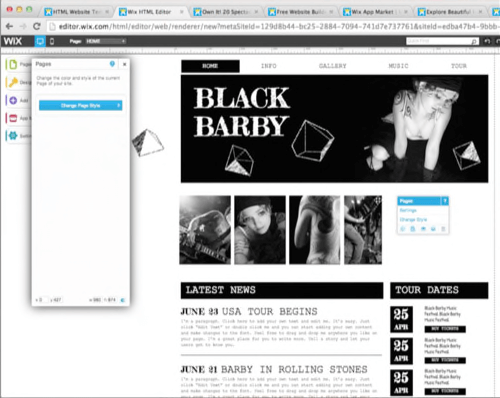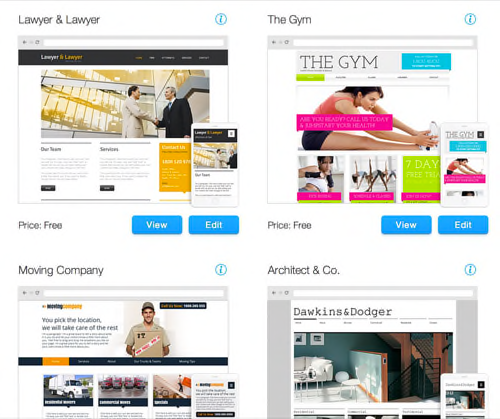
I hardly consider myself a coder. I just remember how, when I first encountered blocky, awkward, ugly site-building tools like Angelfire and GeoCities, I decided I could do a better job myself.
So I taught myself hypertext markup language, or HTML, the lingua franca of the Web; cascading style sheets, or CSS, a basic tool for describing a website’s layouts; and JavaScript, a relatively simple programming language used to make websites interactive. If those skills prompt anyone to call me a coder, I’ll take the compliment.
When I heard about Wix, an online website builder, I was skeptical. Web developers and designers tend to turn up their noses at site builders like Wix. Wix’s main feature is a graphical user interface that makes website production easy enough for anyone. But does relying on a tool like that take the “do-it-yourself” out of DIY?
Too Busy To Code?
Visit the main page of Wix and you’ll find photos of models portraying people in specialized careers—a seamstress, a gardener, a chef. They’re presumably managing their busy lifestyles by skipping out on the time-consuming task of learning to code.
There are a lot of those people: More than 47 million people have used Wix to build sites. According to Eric Mason, director of communications at Wix, that’s the whole point.
“Our service is based on HTML, CSS, and JS, but our goal is to ensure that our users never have to even learn what those words mean,” he said.
Who Should Learn To Code?
Software is an increasingly more important part of our daily lives. Whether it’s a cashier using an iPad as a point-of-sale system or a construction worker relying on updated plans sent to a smartphone, nearly every occupation is connected to a computer in some way. We all live in the programmable world.
See also: Anyone Can Learn To Code: A Case Study
Learning to code enriches and deepens anyone’s understanding of this world where nearly every aspect of our lives can be tweaked, managed, and improved through software. But does that mean everyone needs to be a coder?
For Mason, it’s almost a classist issue. Coding, in his view, is a highly specialized skill that takes years of practice, and not every small business owner has the resources or time to put their business on hold and master it.

“In a world where content is still really king, developing a business brand is a full-time job,” said Mason. “If you’re learning to code on top of that, you lose the ability to go out and do business.
“There’s an intimidation factor. There’s a hierarchy, with developers and designers at the top, that trickles down to ordinary people who just need websites. I think code is wildly important—half of the 700 people who work at Wix are engineers. But I think it’s also important to have a solution for everyone else.”
The downside of this democratic approach is that Wix has struggled to win favor among those who make their living by coding. Wix lets experienced coders reach its millions of customers by offering their skills through Wix Arena, a marketplace for Web-design services, but Mason says it been a tough sell—partly because not all Wix websites are works of art. People can make whatever they want on Wix, which means that for all the slick templates, there are also some real eyesores.
What Wix Offers Everyday Website Builders
See also: Why Citizen Developers Are The Future Of Programming
Wix began in 2006 as a tool for generating Flash-only websites. It’s hard to remember that now, but there was a time when Adobe’s Flash technology, known for adding animations and other interactive elements to websites, was cutting edge. But it wasn’t built for mobile devices, and its usage has sharply declined. As Flash’s influence waned, so did Wix’s, until 2012 when the company launched tools for editing websites built entirely on HTML5, the latest version of the HTML standard.
On Wix, you begin with a template designed for a particular kind of small business—anything from childcare to consulting to law—and drag and drop your way to a custom site. As long as you stay under 30 pages of content and don’t want any plugins, it’s free.

All Wix sites are responsive to the device people use to browse them, meaning they adjust layout and display elements for smartphones, tablets, and laptops. That includes free, customizable mobile versions which you can design to be strikingly different from their desktop versions. You can add music, videos, custom images, and anything you can think of to these static sites.
“This is not a template site,” said Mason. “Templates are built in blocks. Wix is built in layers. You can drag and drop any part of a Wix site, and it’ll convert into code.”
Unlike those early site-builders I remember, Wix is remarkably customizable. Playing with it makes me think that, had I discovered it in my formative years, I probably would’ve never turned to learning HTML.
But Mason suggests that many Wix users do go on to become familiar with the basics of website code.
“When they outgrow Wix, they become more informed about code, not less,” he said. “When they go on to work with Web designers, they can be more articulate about what they want.”
Thanks to the increasing flexibility of HTML5, Wix truly is a shortcut for people who want to get a business online but don’t have time to learn to code. And while it’s hard for coders to admit it, that’s what the Internet needs. In a world where coders are king, Wix gives democracy a try.
Photos via Wix

















